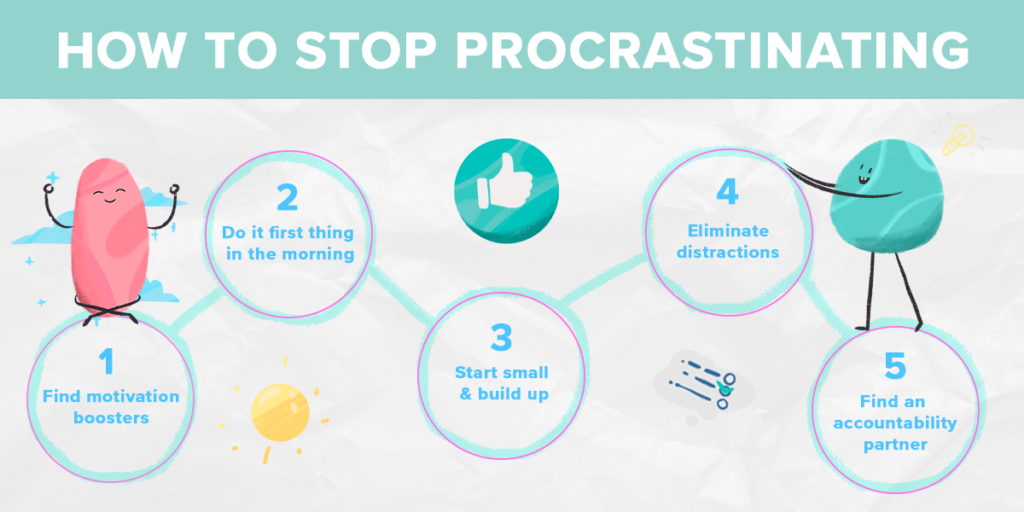From Delay to Action: Practical Steps on How to Overcome Procrastination

Procrastination, or voluntarily delaying certain activities, is a feeling many are familiar with. While occasional procrastination is a common experience, chronic or excessive procrastination can be detrimental to one’s mental health, performance, and overall success.
Even though it may result in negative feelings toward oneself, increased stress, decreased productivity, and missed deadlines, overcoming procrastination is more complicated than it seems.
Therefore, if you’re someone who can’t stop procrastinating, learning how to overcome procrastination can be highly beneficial. In this article, we will explore the reasons behind it and introduce you to proven procrastination management techniques.
In this article
Procrastination: Understanding the Problem
Many still believe that procrastination and laziness are synonymous terms. However, that’s not true at all.
Procrastination often occurs when individuals prioritize short-term comfort or immediate gratification over long-term goals or responsibilities.
In other words, procrastination is an emotional reaction to tasks and activities that create discomfort, while laziness is simply refusing to act to do something – even if the task at hand is pleasurable.
The procrastination habit does not appear overnight, too – often, it stems from a prolonged engagement in unnecessary distractions, feeling overwhelmed by the workload, or experiencing difficulty making decisions.
Moreover, procrastination can be caused by fear of failure, perfectionism, low self-confidence, lack of motivation, low self-control, or poor prioritization skills. Recognizing and addressing these factors can help develop effective strategies to manage and overcome procrastination.
Strategies to Combat Procrastination
Overcoming procrastination is quite a big task on its own – it requires building habits, coping with negative emotions that stem from particular activities, and putting in a conscious effort to prevent procrastination in daily life.
While there is no one-size-fits-all approach when learning how to overcome procrastination, there are several strategies that can prove to be effective.
Breaking down tasks into manageable pieces
Often, tasks appear daunting because they are exceptionally large, and that can be overwhelming because you don’t know where to start.
Break down big projects into smaller tasks that are easier to complete. This way, you can create a to-do list consisting of manageable chunks, approach each step with ease, and eliminate unnecessary anxiety.
If a small task still seems too formidable, don’t hesitate to break it down even more!
Encouraging small starts
Getting started is frequently the most challenging part of any activity. Overcoming this initial resistance requires embracing the concept of small starts.
Instead of focusing on the entire task, try to work on it for just a few minutes. Once you begin, you’ll often find that it’s easier to gain momentum and overcome the procrastination that was holding you down initially.
Acceptance of imperfection: giving yourself permission to make mistakes
For many, perfectionism significantly contributes to delaying tasks. The fear of making mistakes or failing to meet self-imposed high standards can paralyze progress.
Embrace the fact that imperfections are a natural part of the learning process. You probably didn’t do it on the first try while learning to walk or talk!
Hence, give yourself permission to make mistakes and view them as valuable opportunities for growth and improvement.
Making decision-making easier
Overthinking every step can unnecessarily complicate your ability to complete tasks. To overcome procrastination caused by indecision, employ strategies that streamline decision-making.
Set clear criteria for making choices, establish specific deadlines for decision-making, and limit the options available. Make it simple and reasonable.
Motivation boosting techniques
Maintaining motivation is crucial in the process of overcoming procrastination. Discover techniques that work best for you, such as visualizing the end result, setting realistic goals, finding sources of inspiration, or utilizing a reward system.
Explore various motivational strategies and incorporate them into your routine to keep your focus and drive alive.
Increasing your energy to avoid procrastination
Lack of energy can be a significant factor contributing to procrastination. Prioritize self-care and engage in activities that boost your energy levels – try exercise, healthy eating, and a good night’s sleep.
By taking care of your physical well-being, you enhance your productivity and increase the chance of maintaining procrastination for the day. In the long run, these healthy habits can help overcome procrastination overall.

Enhancing Your Environment to Avoid Procrastination
Our physical surroundings and the conditions we work or study in can either support or interfere with our ability to stay focused and productive.
Therefore, looking at and enhancing our environment is one of the most important things when trying to prevent procrastination.
Creating a productive work atmosphere
While clutter can look cute, it can also be distracting – your sight and focus shifts to the items in your work area instead of focusing on a particular task that has to be done.
Optimize your workspace by minimizing distractions, organizing materials, and creating a clutter-free zone. Surround yourself with elements that promote concentration and creativity, such as natural light, soothing colors, and inspiring visuals.
Employing social techniques for accountability
Accountability can be a powerful tool in overcoming procrastination. Engage with others who share similar goals and create an accountability system.
This can involve regular check-ins, sharing progress updates, or partnering with an accountability buddy. Making your plans public and involving others increases your commitment and motivation to follow through.
Establishing healthy work routines and rituals
Developing consistent work routines and rituals can provide structure and minimize the temptation to procrastinate. Create a daily to-do list with dedicated work periods, breaks, and specific rituals that signal the start and end of work.
By establishing these habits, you condition your mind to focus more effortlessly and enter a productive state.
Moreover, take a look at time management techniques that could help you structurize the time you spend working. The Pomodoro technique could be highly beneficial for overcoming procrastination.
Managing Time Effectively to Beat Procrastination
Effectively managing time can often be a problem for people who procrastinate – they delay important tasks until the last minute because they lose track of time. However, being unaware of time can have negative consequences professionally and personally, too!
Time management techniques can prove to be helpful while completing tasks. Try researching and employing the Pomodoro technique, Pickle Jar theory, or create a time system that works for you.
Here are some other suggestions for better time management.
Setting and respecting deadlines
Setting clear deadlines is essential for effective time management and overcoming procrastination. Break down tasks into manageable time frames and assign deadlines to each phase.
Hold yourself accountable to these deadlines, thus creating a sense of urgency and reducing the tendency to delay tasks.
The power of immediate task completion
If a task takes only a few minutes to complete, do it immediately rather than add it to your to-do list. This practice frees up mental space and prevents the accumulation of small tasks that can lead to overwhelm and procrastination.
The benefits of task switching and taking breaks
Contrary to popular belief, incorporating planned breaks and task-switching can enhance productivity and reduce procrastination.
Our brains thrive on variety. Occasionally shifting focus from unimportant tasks to a more fun project can prevent boredom and maintain engagement.
Addressing bottlenecks and dealing with procrastination hotspots
Identify specific blockages or triggers that contribute to procrastination in your life. It could be a particular environment, a boring task, or even certain times of the day.
Once identified, explore strategies to address these bottlenecks – modify your environment or switch it up completely, do the hardest tasks first thing in the morning, seek support, employ time management techniques to work through tedious projects, or find alternative approaches to tackle important tasks.
Harnessing Emotional Intelligence to Overcome Procrastination
Procrastination is an emotional regulation issue. Therefore, digging deeper into your emotional state is crucial when learning how to overcome procrastination.
The role of self-efficacy in overcoming procrastination
Self-efficacy, or the belief in your ability to accomplish tasks, is vital in overcoming procrastination.
Nurture a growth mindset and focus on your past successes – recognize that you have the skills and capabilities to overcome challenges and complete tasks effectively.
By building self-efficacy, you boost your confidence and reduce the likelihood of procrastination as you have more faith in yourself.
Cultivating self-compassion to mitigate procrastination
Practicing self-compassion is essential in the journey of overcoming procrastination. Be kind and understanding toward yourself when facing setbacks or difficulties – they happen to everyone.
Treat yourself with the same empathy and understanding you would offer a close friend. By fostering self-forgiveness and compassion, you create a supportive inner environment that encourages progress and, in the long run, helps you stop procrastinating due to fear of failure.
Emotional regulation and its impact on procrastination
By developing emotional intelligence, you enhance your ability to navigate emotional roadblocks and maintain focus on your tasks.
Try using techniques to recognize and regulate emotions effectively. For example, deep breathing, mindfulness, or journaling could significantly improve your emotional well-being.
Activities such as yoga, meditation, or self-reflection are also helpful in understanding the nature of your emotions and how to control them.
When Procrastination Signals Deeper Issues
While occasional procrastination and the inability to concentrate are something many people face every day, chronic procrastination can warn about underlying problems that must be solved beforehand.
Procrastination and underlying conditions
Chronic procrastination may sometimes be a sign of underlying mental health conditions or emotional difficulties. Illnesses and disorders like depression, anxiety, ADHD, and severe stress can highly impact your ability to focus and be productive.
It is essential to recognize when procrastination goes beyond ordinary productivity challenges. Hence, if procrastination significantly impacts your daily life or mental well-being, consider seeking professional help to address any underlying issues.
When to seek professional help for chronic procrastination
If procrastination persists despite your best efforts or significantly hinders your productivity and overall well-being, it may be beneficial to consult a mental health professional.
They can help identify and address the root causes of chronic procrastination and provide tailored strategies to support your progress.
Moreover, mental health professionals can evaluate your mental well-being and provide a treatment plan for underlying conditions that impact your procrastination habits.
Work through important tasks with Sensa
The Sensa app can be a valuable tool if you’re prepared to combat your procrastination habits. Sensa provides daily guidance and support while employing practical strategies to help manage procrastination.
A personalized plan in the Sensa app provides practical knowledge about the reasons behind your procrastination and offers CBT-based exercises to tackle the issue.
Moreover, Sensa helps build lasting habits and emotional intelligence – two essential factors that aid in overcoming the procrastination problem.
Recap: Key Steps to Overcoming Procrastination
Overcoming procrastination is not easy, and it’s alright if it doesn’t happen on the first try.
It’s a journey that requires patience, self-reflection, and perseverance. But by employing time management techniques, enhancing your environment, and nurturing your emotional intelligence, you can help yourself become more productive and successful.
These practical steps and techniques explored above, you can transform delay into action and unlock your true potential. Start today and embrace a future filled with accomplishment, focus, and joy.
Frequently Asked Questions
How do I stop myself from procrastinating?
Procrastination is the act of delaying or postponing tasks or decisions. It can be a frustrating and self-defeating habit, but it can be overcome with the right strategies. Here are a few tips:
- Identify your procrastination triggers. What are the situations or thoughts that make you procrastinate? Once you know your triggers, you can start to avoid them or develop strategies to cope with them.
- Break down large tasks into smaller, more manageable steps. This will make the tasks seem less daunting and more achievable.
- Set realistic deadlines for yourself. Don’t set yourself up for failure by giving yourself too much to do in too little time.
- Reward yourself for completing tasks. This will help to motivate you and make the process more enjoyable.
- Get organized and eliminate distractions. Create a workspace that is free from clutter and distractions.
- Tackle the most difficult tasks first. This will help you to get the most challenging part of the task out of the way and make the rest of the work seem easier.
- Don’t be afraid to ask for help. If you’re struggling to complete a task, don’t be afraid to ask for help from a friend, family member, or colleague.
What is the best way to beat procrastination?
There is no one-size-fits-all answer to this question, as the best way to beat procrastination will vary depending on the individual. However, there are a few general tips that can help:
- Identify your procrastination triggers. Once you know what’s causing you to procrastinate, you can start to avoid them or develop strategies to cope with them.
- Set realistic goals. Don’t try to do too much too soon. Set small, achievable goals that you can gradually work towards.
- Break down tasks into smaller steps. This will make the tasks seem less daunting and more achievable.
- Track your progress. This will help you to stay motivated and on track.
- Reward yourself for completing tasks. This will help to reinforce positive behavior and make the process more enjoyable.
What are the 7 steps to cure procrastination?
- Identify your procrastination triggers. What are the situations or thoughts that make you procrastinate? Once you know your triggers, you can start to avoid them or develop strategies to cope with them.
- Break down large tasks into smaller, more manageable steps. This will make the tasks seem less daunting and more achievable.
- Set realistic deadlines for yourself. Don’t set yourself up for failure by giving yourself too much to do in too little time.
- Tackle the most difficult tasks first. This will help you to get the most challenging part of the task out of the way and make the rest of the work seem easier.
- Establish a routine and stick to it. This will help you to stay on track and avoid procrastination.
- Learn to say no to distractions. Minimize distractions such as social media, email, and phone calls.
- Reward yourself for completing tasks. This will help to reinforce positive behavior and make the process more enjoyable.
How do I overcome extreme procrastination?
Overcoming extreme procrastination can be a challenge, but it is possible with the right strategies. Here are a few tips:
- Seek professional help. If you’re struggling to overcome procrastination on your own, consider talking to a therapist or counselor. They can provide you with personalized guidance and support.
- Join a support group. Connecting with others who are struggling with procrastination can provide you with motivation and encouragement.
- Make small changes to your lifestyle. These changes can help to reduce stress and improve your overall well-being, which can make it easier to overcome procrastination.
- Be patient with yourself. Overcoming procrastination takes time and effort. Don’t be discouraged if you slip up occasionally. Just keep practicing and you will eventually succeed.
References:
- van Eerde, W. and Klingsieck, K.B., 2018. Overcoming procrastination? A meta-analysis of intervention studies. Educational Research Review, 25, pp.73-85.
- Eckert, M., Ebert, D.D., Lehr, D., Sieland, B. and Berking, M., 2016. Overcome procrastination: Enhancing emotion regulation skills reduce procrastination. Learning and Individual Differences, 52, pp.10-18.
- Otermin-Cristeta, S. and Hautzinger, M., 2018. Developing an intervention to overcome procrastination. Journal of Prevention & Intervention in the Community, 46(2), pp.171-183.
- Newton, P., 2014. How to overcome procrastination.
- De Cremer, D., 2013. The proactive leader: How to overcome procrastination and be a bold decision-maker. Springer.
- Nábělková, E. and Ratkovská, J., 2015. Academic procrastination and factors contributing to its overcoming. The new educational review, 39, pp.107-118.





